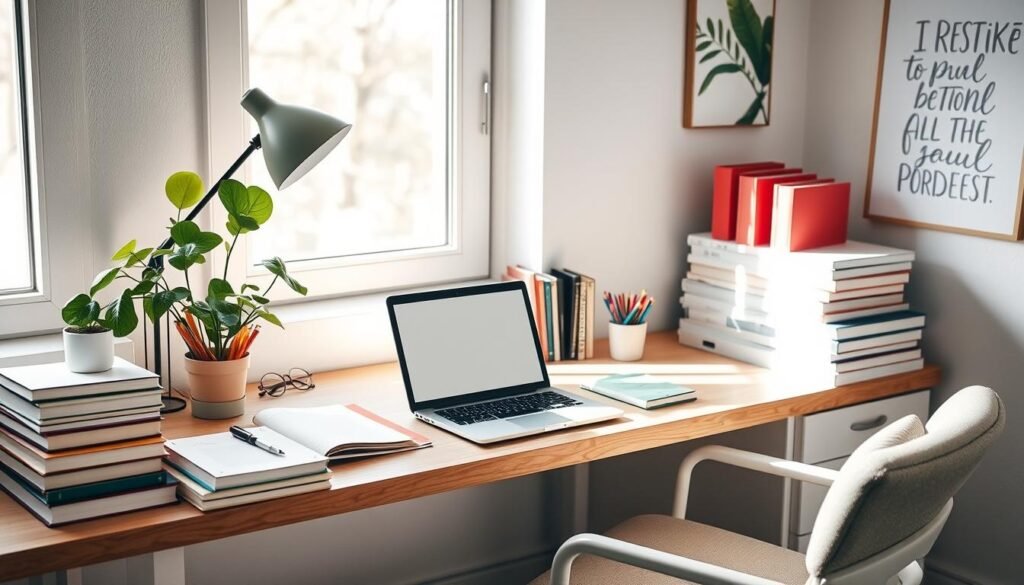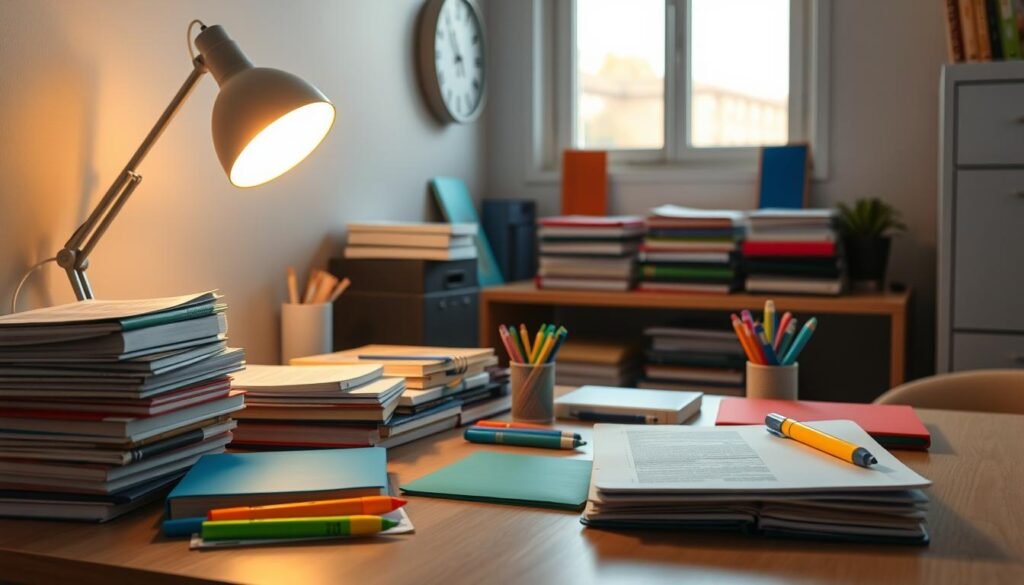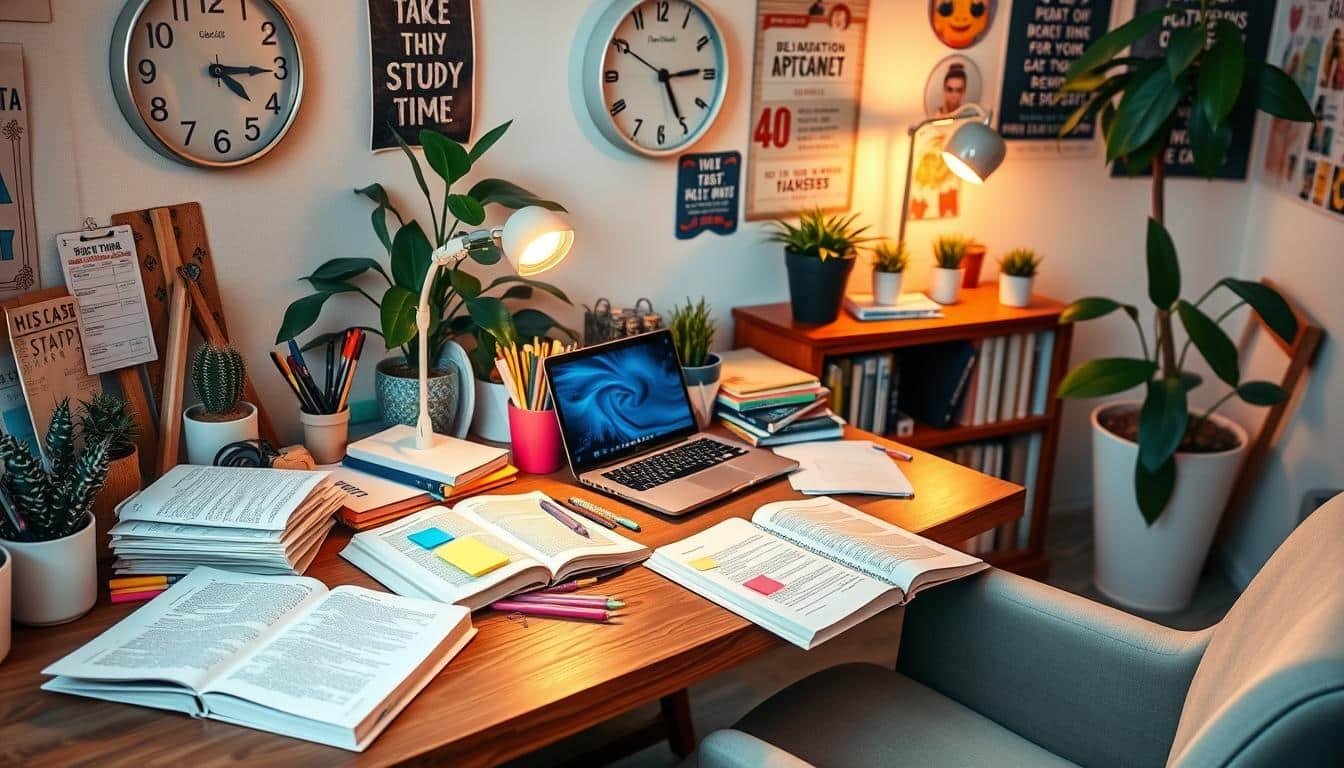Best Study Tips For Exams can make many students feel stressed and anxious. But they are key to learning. Studies show that regular tests help students remember more and feel less nervous. By knowing the exam format, managing your time well, and using effective study methods, you can do better and feel more confident. This guide will give you the top study tips to do well on your exams.
Also Read: Facilities And Resources At University Hawaii Pacific
Key Takeaways
- Familiarize yourself with the exam format and expectations to develop a targeted study plan.
- Divide complex concepts into manageable chunks and review material regularly to maximize learning.
- Attend all classes and review sessions, and find the right study environment to optimize your preparation.
- Take care of your physical and mental well-being on test day to manage stress and anxiety.
- Incorporate relaxation techniques to stay calm and focused during the exam.
Preparation Strategies for Exam Success
Getting ready for exams can feel overwhelming, but with the right strategies, you can do great. First, make sure you know what the exam will cover and what your teacher expects.
Also Read: How Are Salvage Rights Determined Under Admiralty Law?
Get Informed About the Exam Format
Learn about the topics and chapters you’ll see on the exam. Also, find out the test type, like multiple-choice or essay. This info helps you focus your exam preparation efforts.
Understand Your Teacher’s Expectations
Look at past assignments and quizzes to see what your teacher wants. Notice the types of questions they ask and the level of detail they expect. This will help you meet teacher expectations and make study materials that work for you.
Create Personalized Study Aids
Use what you’ve learned to make personalized study materials that fit your learning style and the exam’s needs. This might be flashcards, practice tests, or summaries. Any customized study strategies that help you understand exam format are good.
Preparing well and getting the right info puts you on the path to exam preparation success.
Also Read: Student Organizations At The University Illinois Urbana Champaign
Study Techniques to Maximize Learning

Getting good grades in exams is more than just reading or memorizing. You need to use effective study methods to break down hard topics and remember them later. By adding these strategies to your study plan, you can improve how well you understand and do well on exams.
Divide Complex Concepts into Manageable Chunks
When dealing with tough or detailed subjects, it’s key to break it down into smaller, more manageable pieces. This makes it less scary and easier to get. First, find the main topics, definitions, and how they connect. Then, understand each part by itself before putting them together.
Also Read: What Role Do Securities Law Play In Preventing Financial Crises And Market Instability?
Review Material Regularly and Early
- Regular review of the material is key for learning and remembering well.
- Don’t wait till the last minute to start studying; review early and often. This slow approach helps you build your knowledge and understanding over time, avoiding cramming.
- Spaced repetition, where you go over the material at set times, can really help your long-term memory and recall.
Using these effective study techniques, you can break down complex topics, review the material consistently, and greatly improve your learning and exam performance.
“The key to success in any exam is not just memorizing facts, but truly understanding the concepts and being able to apply them. Consistent review and active engagement with the material are essential for long-term retention and mastery.”
Also Read: Campus Life At The University Of Toronto
Best Study Tips For Exams

To do well on exams, you need a good study plan. It’s not just about memorizing facts. Using effective study methods helps you understand and use the material better. Here are some top tips for doing well on exams:
Attend All Classes and Review Sessions
Going to all your classes and taking part is key to doing well. Make sure to go to any review sessions your teacher offers. These are great for learning about the exam and clearing up any questions you have.
Study with Classmates or a Study Group
Studying with friends can really help you get ready for exams. You can talk about the material, get help with tough topics, and hear different views. Plus, it keeps you motivated and on track with your studying.
Find the Right Study Environment
Try out different places to see where you study best. It could be a quiet library, a café, or a home office. Look for a spot that has few distractions and lets you focus. Think about things like the lighting, temperature, and noise level to make a space that helps you concentrate and be productive.
“The key to effective studying is finding the right balance between focused attention and strategic breaks. Experiment with different techniques and environments to discover what works best for you.”
Going to classes, joining review sessions, studying with others, and setting up a good study area are all important for doing well on exams. By using these top study tips, you’ll be ready to do great on your exams.
Strategies for Test Day

As the big exam day comes closer, it’s key to look after your body and mind. This ensures you do your best. Taking steps to stay calm and focused can help you do well on the exam.
Take Care of Your Physical and Mental Well-being
On test day, make sure you get enough sleep, eat well, and drink plenty of water. These actions will keep you energized and ready for the exam. Also, don’t forget to look after your mental health by using relaxation techniques to handle anxiety.
Manage Test Anxiety with Relaxation Techniques
It’s normal to feel nervous before a big exam. But, you can use relaxation techniques to keep your anxiety under control. Try deep breathing, meditation, or a short walk to clear your mind. This way, you can stay calm and confident during the test.
Success on test day comes from balancing your physical and mental health. With the right preparation and mindset, you can overcome even tough exams.
“Preparation is the key to success, and a calm mind is the foundation for your best performance.”
Also Read: LEED Exam Accreditation: Career Benefits And Opportunities
Conclusion
By following the tips in this guide, you can do great in exams. Make sure you know the exam format and use good study methods. Also, take care of your body and mind.
With hard work and the right strategy, you can pass your exams and reach your goals.
This article highlights the importance of exam success and gives you key study tips. By using these strategies, you’ll be ready to do well in your exams and advance in your studies.
If you’re a student or someone looking to get better at studying, this guide has what you need. Use these study tips to help you succeed in your exams. With a positive attitude and action, you can reach your full potential and take advantage of your learning opportunities.
FAQs
Q: How can I effectively organize my study space for exams?
A: To organize your study space, ensure it is clean and free from distractions. Use a comfortable chair and desk, and have all your materials such as textbooks, notes, and flashcards readily available. Personalize your space with motivational quotes or diagrams to make it conducive for studying.
Q: What are the best ways to take breaks during my study sessions?
A: The best way to take breaks is to use the Pomodoro Technique, where you study for 25 minutes and then take a 5-minute break. During the break, step away from your study space to refresh your mind. This can help you stay focused and maintain your concentration.
Q: How can I motivate myself to study when I feel distracted?
A: To stay motivated, create a study routine that includes specific goals and rewards for each study session. Use apps to block distracting websites and set a timer for focused study intervals. Remind yourself of the importance of your exams and the benefits of doing well in your courses.
Q: What study habits should I adopt to prepare for a test effectively?
A: Adopt study habits like organizing your study materials, using flashcards for memorization, and testing your knowledge with practice quizzes. Additionally, develop a routine that includes consistent hours to study each week, allowing you to cover all sections of the syllabus thoroughly.
Q: How can I use flashcards to enhance my study routine?
A: Flashcards are a great tool for memorization and testing your knowledge. Create flashcards for key terms and concepts from your textbooks or class notes. Regularly review them and shuffle them to ensure you can recall information without relying on the order.
Q: What should I do the night before the exam to be prepared?
A: The night before the exam, review your syllabus and study materials but avoid cramming. Organize everything you will need for the exam, including pens, identification, and any allowed materials. Get a good night’s sleep to ensure you’re well-rested and able to concentrate on the test.
Q: How do I find a balance between studying and taking breaks?
A: Finding a balance involves planning your study sessions and breaks accordingly. Schedule specific times for studying and incorporate regular study breaks to prevent burnout. Listen to your body; if you feel fatigued, take a break to recharge before returning to your study materials.
Q: What resources can I use if I’m struggling to understand course material?
A: If you’re struggling with course material, consider seeking help from a tutor or joining a study group. Collaborating with peers allows you to work together, share different study techniques, and gain a better understanding of complex topics.
Q: How can I effectively test my knowledge before exams?
A: To test your knowledge, take practice exams or quizzes related to your subject. Use diagram charts to visualize information and participate in study sessions where you can explain topics to others. This active engagement will help reinforce your understanding and retention of the material.
Source Links
- https://www.princetonreview.com/college-advice/how-to-study-for-a-test
- https://shorelight.com/student-stories/21-best-study-tips-for-final-exams/
- https://www.uwec.edu/offices-services/student-success-center/academic-skills-center/resources-tips-and-tools-students-0





